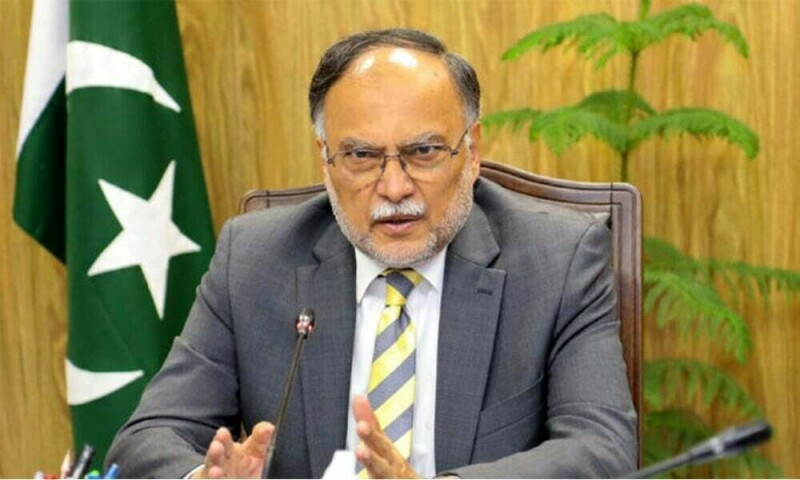Priority projects in roads, railways and maritime sector must be shortlisted in first phase of multi-modal network, which could be done by effectively analysing missing links across the region, Planning minister Ahsan Iqbal said on Wednesday.
His remarks came in the second consultative meeting of the Working Group on Multimodal Connectivity that was held with participation from key government stakeholders, including the Ministry of Commerce, Ministry of Finance, Federal Board of Revenue (FBR), Ministry of Communications, Ministry of Railways, Ministry of Maritime Affairs, and the Aviation Division.
During the meeting, the working group presented a comprehensive review of currently operational trade corridors and proposed new routes to strengthen regional connectivity.
The Planning minister reviewed the existing corridors, while discussions were held on proposed road, rail and maritime linkages.
In follow-up to the previous meeting, the Ministry of Communications had been tasked with reviewing existing transport infrastructure, regulatory frameworks, and policy instruments along identified trade corridors.
Pakistan’s $60bn export target: Ministers told to craft business plans
The Ministry of Foreign Affairs, Ministry of Maritime Affairs, Ministry of Railways, and the Aviation Division were assigned to evaluate relevant regional and international agreements that could facilitate economic integration through new routes.
Highlighting Turkmenistan as a comparatively shorter and viable transit option, he directed that a thorough assessment of this route’s feasibility be undertaken.
Reflecting on his recent visit to Turkmenistan for the 1st ECO Ministerial Forum on Sustainable Development, the minister noted the country’s keen interest in fostering regional connectivity.
On a query regarding Turkmenistan’s potential use of Gwadar Port, the minister was apprised by the Ministry of Maritime Affairs that the port is operational, and 100 acres of land have been allocated for an off-dock terminal.
The PC-1 for its development is under preparation for proposed inclusion in PSDP 2025–26. Recalling the prospect of Gwadar–Oman sea connectivity as discussed in previous meeting, the Minister advised the concerned Ministry to share progress on this initiative in the next meeting.
Minister Ahsan Iqbal further emphasised the need for effective phasing in the planning of the multi modal connectivity network to identify infrastructural and policy challenges that may arise in the development of new trade corridors.
The Ministry of Communications presented a three years’ summary of the movement of NLC trucks operating through three key trade corridors: the Trans-Afghan Corridor, the North-South Corridor, and the China-Pakistan Economic Corridor (CPEC).
Ministry of Communications briefed the minister that in 2023, Pakistan transported the highest number of trucks to Uzbekistan, as compared to other Central Asian countries.
In 2024, Afghanistan took the lead as the primary recipient of Pakistani trucked exports. The official from Ministry of Communications also briefed the Minister that current figures for 2025 indicate that the top three countries to have received Pakistani trucked exports so far had been China, Uzbekistan and Afghanistan, respectively.
“These trends reflect Pakistan’s growing engagement with neighboring markets and underscore the importance of developing efficient multimodal trade corridors to enhance regional connectivity and economic integration, stated the Planning Minister.”
Only uplift-oriented projects be included in PSDP: minister
The Minister also stated, “Priority projects in roads, railways and maritime sector must be shortlisted in first phase of multi-modal network, which can be done by effectively analysing missing links across the region. This will help Pakistan establish trade connectivity with the energy-rich Central Asia.”
He instructed Ministry of Railways, Ministry of Communication and Ministry of Maritime affairs to carry out extensive consultative reviews of key infrastructure projects to identify the projects that need to be recommended for phase one.
“Execution of the multimodal connectivity network will help Pakistan diversify its trade mix while providing Central Asian nations with access to South Asian markets via Gwadar, Karachi, and new routes. This mutually beneficial arrangement has immense potential to strengthen economic interdependence and regional connectivity.”
Reflecting on the potential of trading with Central Asian region, the minister emphasised that Central Asia’s collective GDP of over $207 billion and a population of 66 million represent a substantial market for Pakistani exports, including textiles, pharmaceuticals, and agricultural products. Strengthening trade and investment linkages with these countries can lay the foundation for a regional economic bloc that benefits all stakeholders, he stressed.
Recommendations made by respective departments involved in the joint working group included execution of a cross-institutional study to assess the potential benefits and challenges of establishing international corridors. The group also proposed an in-depth economic impact study to evaluate the benefits of trade routes from Pakistan to Russia via Central Asia.
The meeting concluded with Planning Minister’s direction to all line ministries to finalise a comprehensive report on the proposed multimodal connectivity framework with phase one priority projects for submission to the prime minister.


